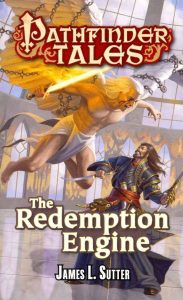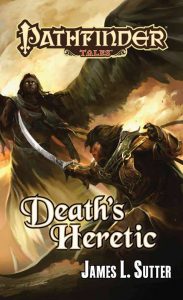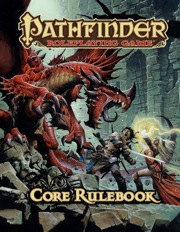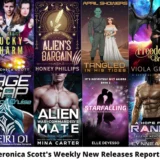 James L. Sutter is a co-creator of the Pathfinder Roleplaying Game and the Creative Director of the Starfinder Roleplaying Game for Paizo Publishing, as well as the head of the Pathfinder Tales novel line. He is the author of the novels Death’s Heretic and The Redemption Engine, plus short stories for such publications as Escape Pod, Apex Magazine, Beneath Ceaseless Skies, and the #1 Amazon best-seller Machine of Death. He has edited the educational anthology Before They Were Giants and published a wealth of award-winning gaming material for both Dungeons & Dragons and the Pathfinder Roleplaying Game. For more information, find him on Twitter at @jameslsutter or at jameslsutter.com.
James L. Sutter is a co-creator of the Pathfinder Roleplaying Game and the Creative Director of the Starfinder Roleplaying Game for Paizo Publishing, as well as the head of the Pathfinder Tales novel line. He is the author of the novels Death’s Heretic and The Redemption Engine, plus short stories for such publications as Escape Pod, Apex Magazine, Beneath Ceaseless Skies, and the #1 Amazon best-seller Machine of Death. He has edited the educational anthology Before They Were Giants and published a wealth of award-winning gaming material for both Dungeons & Dragons and the Pathfinder Roleplaying Game. For more information, find him on Twitter at @jameslsutter or at jameslsutter.com.
How exactly does an RPG work? What does the publisher provide and how does the player participate?
Roleplaying games are part group storytelling and part improv. Each player takes on the role of a given character and tries to describe their character’s actions or reactions to situations presented by the Game Master, who acts like the director, presenting players with a series of linked challenges called an adventure. In most roleplaying games, you use dice and pre-set statistics to help you determine whether your character succeeds at particular actions. So if the Game Master (or GM) tells you a bunch of orcs bust into the tavern, and you decide you want to attack with your sword, you’ll look at the statistics for how good you are with your sword, then roll dice to see if you succeed. In short: That archetypal scene of a bunch of people rolling dice and talking in funny voices about how they cast magic missiles at the monsters are pretty much spot-on.
In terms of wha t a publisher provides, there can be a lot of different products. At the most basic level, you don’t really need anything to play an RPG: it’s just group storytelling. But most people use an established game system (like our Pathfinder Roleplaying Game) that has a bunch of rules to help you create characters or adjudicate combat to turn it into more of a tactical game. On top of that basic system, there are pre-published adventures, setting guides to fictional worlds, supplements to help you customize your characters, books full of monsters to fight, miniatures, dice, maps — you name it. You don’t need it all to play, but it can really add to the experience!
t a publisher provides, there can be a lot of different products. At the most basic level, you don’t really need anything to play an RPG: it’s just group storytelling. But most people use an established game system (like our Pathfinder Roleplaying Game) that has a bunch of rules to help you create characters or adjudicate combat to turn it into more of a tactical game. On top of that basic system, there are pre-published adventures, setting guides to fictional worlds, supplements to help you customize your characters, books full of monsters to fight, miniatures, dice, maps — you name it. You don’t need it all to play, but it can really add to the experience!
How many types of stories are there and how often do the updates come out?
There are approximately one bazillion different RPG adventures and sourcebooks out there, and more coming out every day. For Pathfinder, each month we release a new Adventure Path volume, which takes players through a giant six-part adventure series called a campaign…if you think of a single adventure like an episode of a TV show, then an Adventure Path is the whole season. We also publish a bunch of other monthly products like the Pathfinder Player Companions, which give players new options for their characters, and Pathfinder Campaign Setting books, which detail new regions or aspects of our fantasy world to help give GMs ideas for their own adventures. And of course there are always my favorite products — the novels and comic books! They aren’t actually game products, per se, but they’re set in the same world and help GMs and players get immersed in the setting.
What type of game is Pathfinder and how is it similar to/different than D&D?
Pathfinder is a fantasy game that mashes up a bunch of different classic fantasy genres and tropes, from Lord of the Rings and Earthsea to steampunk and horror. Want to be a viking fighting dragons, or an elven vampire-hunter, or a dashing pirate-wizard? We cover all of that. If that sounds similar to D&D, that’s because it is — Pathfinder actually grew out of an older version of the Dungeons & Dragons rules, which were open source at the time.
How did Pathfinder overtake D&D as the most popular RPG?
We actually started off working for D&D — Paizo (the company I work for) originally spun off from Wizards of the Coast (who owns D&D, Magic: The Gathering, and various other games) about 15 years ago. At the time, we licensed the right to produce the official Dungeons & Dragons magazines, which had been going since the 70s. When a few years later Wizards decided to pull the magazine license back in-house, we needed something to sell, so we started making the Pathfinder Adventure Path — pre-made adventures for Dungeons & Dragons that GMs could use to play with minimal preparation time. That worked out fabulously, but a few years later, Dungeons & Dragons switched to a new edition of the rules that was no longer open source. So in order to survive, we decided to create our own version of the game — and because we had a really amazing, loyal audience, a ton of people switched game systems to come play our newly created Pathfinder Roleplaying Game. Over just a few years, we went from being essentially a contractor for Dungeons & Dragons to its biggest competitor, and we’ve been good-naturedly duking it out for the best-selling spot each year for quite some time now.
If all of this talk of editions is confusing, think of it like Mac and PC, or Nintendo and Playstation — we share a lot of the same DNA, and do the same things, but in different ways.
What will S tarfinder involve and when will it be available?
tarfinder involve and when will it be available?
Starfinder is our new science-fantasy game, based off of Pathfinder — think taking all that medieval-style fantasy and advancing it thousands of years into the future, so now you’ve got starships and laser guns along with your wizards and ninjas. It releases August of 2017, so my whole team and I are currently shoulders-deep in getting the project put together!
Who writes the Pathfinder Tales novels and how to they relate to the game?
As the Executive Editor in charge of the line, I commission all the authors, and like to pull in both folks with a long tradition in gaming and authors known for their creator-owned fantasy who also happen to enjoy the game. (After all, most fantasy authors are familiar with RPGs — we’re all nerds together!) Some of my most recent hires include Sam Sykes and Max Gladstone, but I’ve also got Wendy Wagner, Tim Pratt, Liane Merciel, Mike Stackpole…all sorts of people. I’ve even written a couple of the books myself!
In terms of how they relate to the game: They’re set in the same world, but they’re completely standalone, and you don’t need to know anything about the game or the game world in order to enjoy them. For instance, my own books — Death’s Heretic and The Redemption Engine — are all about an atheist detective forced to work for the goddess of death, tracking lost souls through the planes of the afterlife. (Think Blade Runner meets Dante’s Inferno.) If you don’t know anything about Pathfinder, then the books are just great fantasy novels with a really detailed world. But if you already enjoy the game world, the books will give you a ton of interesting insight into the locations and feel of the setting, and vice versa — if you like the novels, there’s a game set in that same world that you might enjoy.
Are there conventions, clubs, and magazines for RPGers?
Tons of them! It’s really a huge hobby. For instance, Gen Con, probably the most iconic pen-and-paper RPG convention in the US, had about 60,000 attendees this year. But there are also smaller conventions all the time, all over the world. For folks interested in Pathfinder specifically, there’s the Pathfinder Society Organized Play Program (https://paizo.com/pathfindersociety), which helps people interested in Pathfinder link up with volunteers running games in their local game stores, libraries, and so forth — there are  thousands and thousands of people currently playing in Pathfinder Society, so odds are, there’s a game near you that would be happy to have you! Whether you’re in Alabama or Istanbul, just go online at https://paizo.com/pathfinderSociety/coordinators and find the coordinator closest to you.
thousands and thousands of people currently playing in Pathfinder Society, so odds are, there’s a game near you that would be happy to have you! Whether you’re in Alabama or Istanbul, just go online at https://paizo.com/pathfinderSociety/coordinators and find the coordinator closest to you.
What’s involved in developing and marketing an RPG?
Imagine the Apollo moonshot, except instead of launching a rocket, you’re publishing game books. And you don’t have JFK on your side.
Seriously, though — that’s an entire interview on its own. As the old joke goes: “How do you make a million dollars in the gaming industry? Start with two million!”
Anything else we need to know about RPGs general and Pathfinder specifically?
Whether you’re an adult or a kid, I think RPGs are extremely good for people. They’re educational — you’re learning statistics and vocabulary and history. They’re social — you’re there in person working as a team, without the dehumanizing distance of the internet, and roleplaying as characters different from yourself promotes empathy and understanding. They’re creative — they turn the players from consumers of media to creators of their own stories, and I’m constantly meeting professional authors and artists who got started writing up backstories for their characters or doodling their characters during games. And the best part is, unlike a video game where everything has to be programmed in advance, you’re collectively making it up as you go along, so your options are literally endless — you can always go through that locked door or trek over the horizon toward that misty mountain. It’s the storytelling equivalent of a musical jam session, and it’s a blast to get to play off your friends’ creativity and build something completely unique together!
Carl has written and interviewed for Tangent Online, Diabolical Plots, SF Signal and File 770.
Read My Profile.









